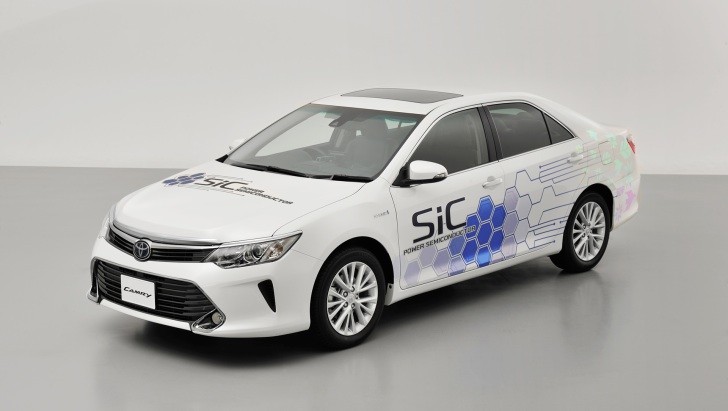Silicon carbide (SiC) seems to be the solution to improve current hybrid and electric vehicle efficiency to boost range and also make them lighter. Or at least that’s what Toyota is betting on for now as it will soon roll out the new technology into a hybrid Camry and fuel cell bus prototypes to test it.
Toyota Motor Corporation will deploy the two vehicles on the streets of Japan to evaluate the performance of silicon carbide power semiconductors found in vehicle power control units (PCUs).
And as you probably know, when an electric current passes through something, that something will respond with a “resistance”, capturing the energy for a bit of time and generating certain amounts of heat. The carbon in the SiC will aid with that delay, thus reducing resistance and heat build-up.
So if part of the energy is not being transformed into heat, it will go where it should be, thus improving efficiency. Currently, the PCU is responsible for a 20 percent power loss in any electric/hybrid vehicle.
Comparing them with data from actual semiconductors will aid assessing the improvement achieved using the new silicon carbide technology. Tests begin in early February this year and will continue for about 12 months.
A similar test is already in progress, involving a fuel cell bus that is in regular commercial use in Toyota City.
What’s SiC and how the PCU works
We’ve talked about silicon carbide technology before, but if you don’t feel like reading the dedicated article here, I’m telling you the PCU is a crucial part in any hybrid or fully electric vehicle out there as it regulates the amount of current coming in and out of the battery from/towards the generator/motor.And as you probably know, when an electric current passes through something, that something will respond with a “resistance”, capturing the energy for a bit of time and generating certain amounts of heat. The carbon in the SiC will aid with that delay, thus reducing resistance and heat build-up.
So if part of the energy is not being transformed into heat, it will go where it should be, thus improving efficiency. Currently, the PCU is responsible for a 20 percent power loss in any electric/hybrid vehicle.
The testing phase
The Camry hybrid prototype will feature SiC power semiconductors (transistors and diodes) in the PCU’s internal voltage converter as well as the inverter that controls the motor. They will start driving it and gather data regarding PCU voltage, current, driving speed, patterns and conditions.Comparing them with data from actual semiconductors will aid assessing the improvement achieved using the new silicon carbide technology. Tests begin in early February this year and will continue for about 12 months.
A similar test is already in progress, involving a fuel cell bus that is in regular commercial use in Toyota City.







